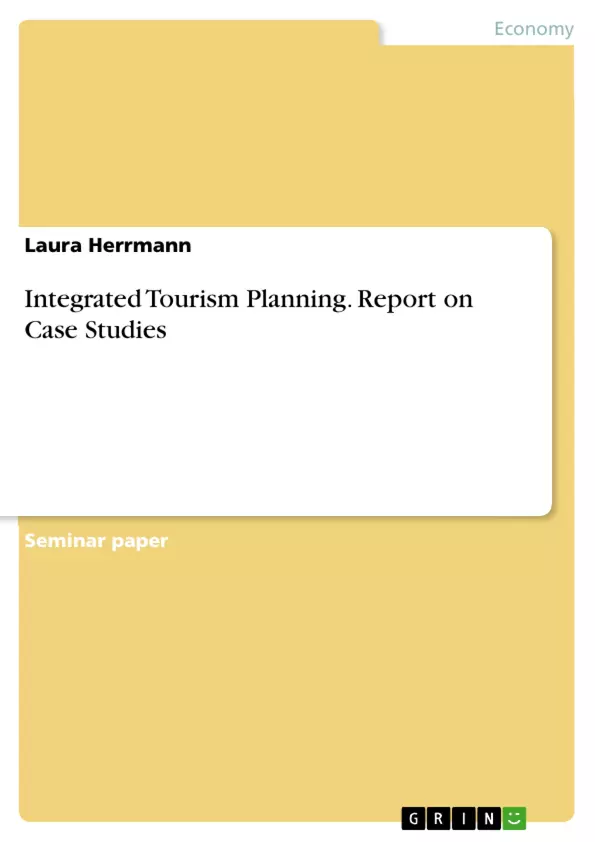Attempts to define the concept of community based tourism often find quite different words
and formulations, but always coming back to close similarities to sustainable tourism, eco
tourism or rural tourism. As a subcategory of sustainable tourism, the term is mostly used in
context with third world countries, but also other rather rural regions (Bittner, 2006).
Community based tourism aims to replace mass tourism and is supposed to make host
communities use the tourism business for self-determination and to involve local residents in
the planning process by complementing their traditional lifestyles with opportunities for
local employment and business (Addison, 1996). Therefore all tourism measures should
focus on the optimization of local economic benefits and protecting the host environment,
natural and built (Page, 2006). Implementing community based tourism, both the tourist and
the host communities should benefit and cross-cultural education and communication is, in
an ideal situation, promoted. Also preserving local traditions and developing a “public
participation program that [makes] clear to local residents the benefits and potential hazards
of the tourism industry” (Addison, 1996: 304) is necessary. Another significant fact is to
promote all-year-around tourism so that the local community does not seasonally depend on
the income of tourism. To realize this, a culturally and environmentally appropriate tourism
plan has to be developed. [...]
Inhaltsverzeichnis (Table of Contents)
- COMMUNITY BASED TOURISM
- PRINCIPLES AND MAJOR GOALS
- MAJOR THREATS
- FUTURE OF COMMUNITY BASED TOURISM
- SEASONALITY
- MAIN FACTORS FOR SEASONALITY
- SEASONALITY IN PERIPHERAL REGIONS
- REDUCING SEASONALITY
- SUSTAINABILITY
- DOES SUSTAINABLE TOURISM EXIST?
- OWN ASSESSMENT
Zielsetzung und Themenschwerpunkte (Objectives and Key Themes)
This report examines the concept of community based tourism, analyzing its principles, potential threats, and future prospects. It explores the role of community based tourism in achieving sustainable development and the challenges involved in its implementation.
- Principles and goals of community based tourism
- Major threats to community based tourism development
- The future of community based tourism
- The relationship between community based tourism and sustainable development
- The role of education, attitudes, and experience in successful community based tourism implementation
Zusammenfassung der Kapitel (Chapter Summaries)
- Chapter 1, Community Based Tourism, outlines the core principles and major goals of community based tourism. It explores its similarities to sustainable and eco-tourism, discussing the potential benefits and challenges associated with implementing this approach in various regions.
- Chapter 1.2, Major Threats, examines the key obstacles to successful community based tourism development. This section analyzes the impact of factors such as education levels, local attitudes, government support, and economic pressures on the long-term viability of community based tourism.
- Chapter 1.3, Future of Community Based Tourism, discusses the potential for community based tourism to become a dominant form of tourism in the future. It evaluates the advantages and limitations of this approach, considering both its environmental and economic aspects. The chapter also explores the role of tourism demand and supply in shaping the future of community based tourism.
Schlüsselwörter (Keywords)
Community-based tourism, sustainable tourism, eco-tourism, rural tourism, environmental sustainability, economic development, local communities, host communities, cultural preservation, tourism planning, government support, stakeholder involvement, education, attitudes, threats to development, future of tourism.
Frequently Asked Questions
What is community-based tourism (CBT)?
CBT is a subcategory of sustainable tourism where local communities manage tourism activities to ensure self-determination and local economic benefits.
How does CBT differ from mass tourism?
Unlike mass tourism, CBT focuses on protecting the environment, preserving local traditions, and involving residents directly in the planning process.
What are the major threats to successful CBT?
Key threats include low education levels, lack of government support, negative local attitudes, and economic pressures for quick profit.
Why is seasonality a challenge for rural tourism?
Seasonality makes communities dependent on income during specific times. CBT aims to promote all-year-around tourism to ensure stable livelihoods.
What is the future of community-based tourism?
The report discusses whether CBT can become a dominant form of tourism by balancing environmental protection with economic viability.
- Arbeit zitieren
- Laura Herrmann (Autor:in), 2013, Integrated Tourism Planning. Report on Case Studies, München, GRIN Verlag, https://www.hausarbeiten.de/document/277877


